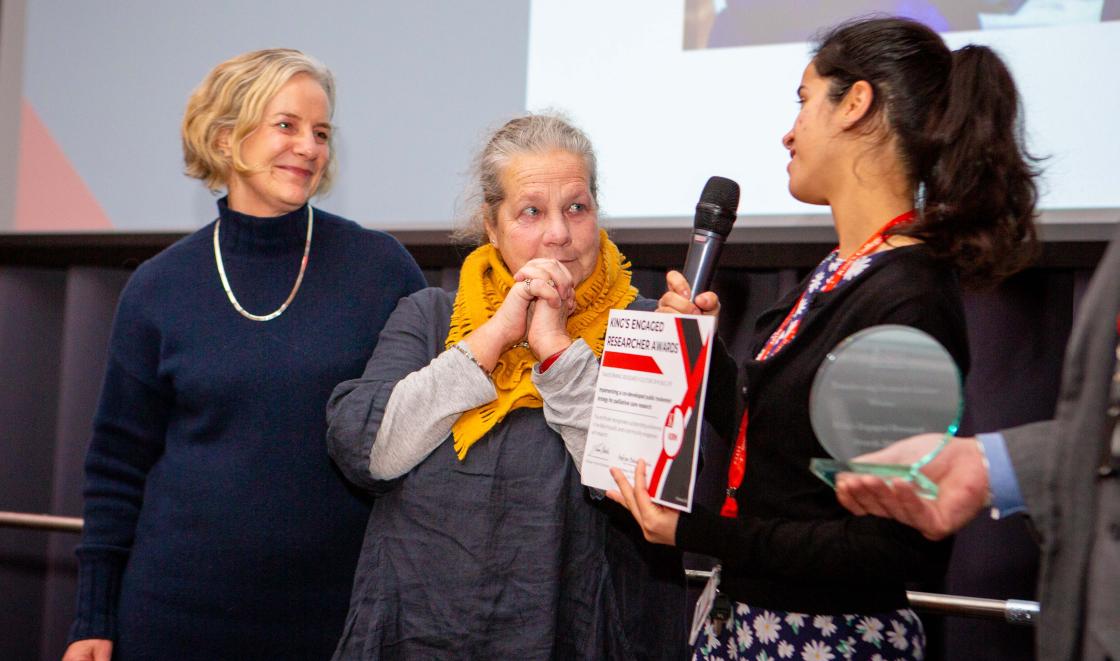The strategy has been the foundation to secure over £44K in involvement/engagement grants (NIHR ARC South London, KCL/Wellcome Fund, UKRI Participatory Research Fund, and Faculty Innovation Funds). The funding enabled us to pursue our five strategy goals. Outlined below are some of the highlights of our work to achieve the goals.
1. A diverse and inclusive public involvement group, with equality of opportunity
Through a community outreach event and continued relationship-building, the diversity of our public involvement membership has increased. For example, our annual audit shows an increase from 2021 to 2022 in Black and Asian members (from 6% to 13% and from 6% to 11%, respectively), increased members reporting living with a disability (from 35% to 50%). Staff have also participated in university-wide Diversity Matters and Trans Matters and learnt about asking about accessibility requirements. We have also developed the use of our Public Involvement Forum which over the past 3 years has seen 62 new members and 343 items posted, including opportunities for public members to be involved in research and updates on CSI projects. Most recently we have also brought together a Dementia Community Research Network (DCRN) aiming to create community partnerships with diverse communities in South London.
2. Ensure support and learning for our public members and staff, including sharing good practice
We have offered yearly PPI training within the MSc Palliative Care at King’s College London through co-delivered lectures and PPI training to research staff. We ran additional training for our local staff in writing in plain language and obtained funding for bespoke training from user-led organisation ‘Shaping Our Lives’ on inclusive participatory research practices. We have also created support resources such as a PPI Member Handbook, a PPI Buddy Scheme and PPI Video Training Series on the Research Cycle.
3. Support our public members and staff to engage with each other and a range of public involvement opportunities
On a bi-yearly basis we have run Dragon’s Den events where researchers are provided with the opportunity to present ideas for future research to public members who can provide feedback and guidance. Over the three years of the strategy period, 15 new projects were supported by our public member community. We delivered novel opportunities to spark early and continued involvement in our research. For example, we ran a workshop with colleagues in Public Health & Social Care about optimal involvement of people with multiple long-term conditions in research; findings of which were then shared at the ARC South London Inside Research seminar, and the national Multimorbidity seminar held by ARC East Midlands. Our teams are also finding creative ways to broaden involvement and engagement in dementia research such as a recent event at the Science Museum.
4. Evaluate and promote the impact of public involvement in our research, education and practice
To share the impact of public involvement on our work, we have hosted a ‘Knowledge Exchange’ to share our experiences (e.g. re. involvement of LGBTQ+ communities) and supported our public members to write blogs about their experiences of involvement (e.g. in dementia and children’s palliative care research). The work to achieve our strategy goals is continuously monitored through quarterly meetings. Feedback on the recent strategy (2021-2023) evaluation has shown where we can further develop our goals and has informed the Public Involvement Strategy 2024-2026.
5. Work in partnership with other organisations to build local, national, and international capacity in public involvement in palliative care
We presented at an ‘All Ireland Institute of Hospice and Palliative Care’ event about public involvement in palliative care, worked with ARC East of England to host two national events on building palliative care public involvement infrastructure, and will be sharing our learning at the 2024 European Association for Palliative Care Congress. We continue to support PhD projects that are developing new ways of involving public members across the globe and build public involvement capacity through research partnerships on topics relating to palliative care in the context of rehabilitation, coastal communities, and primary care.
On Tuesday 16 January, we won an award for ‘Implementing a co-developed public involvement strategy for palliative care research’ in the category ‘Transforming Research Culture’ at the King’s Engaged Research Network (KERN) Awards. The inaugural ceremony was hosted to recognise the innovative public engagement work that researchers are conducting within King's College London. The ceremony was a perfect way to end the work completed over the past three years through the Public Involvement Strategy at the Cicely Saunders Institute.
